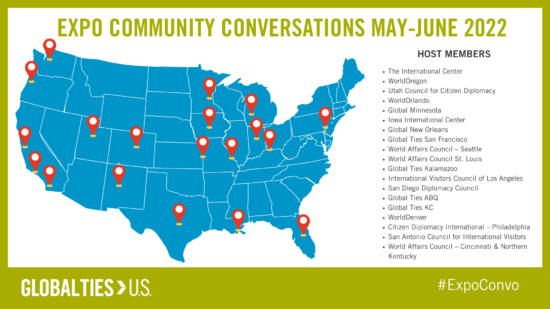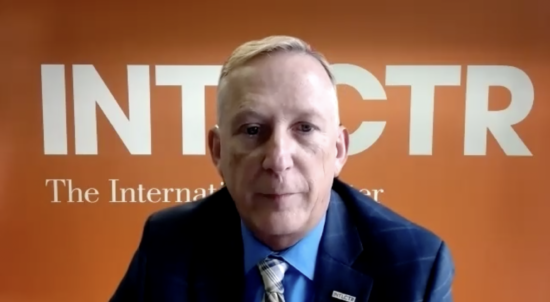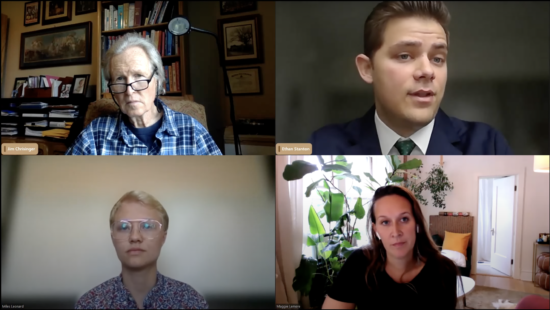By Rachel Mintz, Communications Intern, Global Ties U.S.

The special event series Community Conversations, a continuation of the paper Experiencing Expos: An Oral History of U.S. Citizens’ Engagement with World’s Fairs, 1962-2017, took place across the United States throughout May and June. During these two months, 19 Global Ties Network members hosted in-person and virtual events with the mission of sharing the socio-cultural impact of International Expos, or World’s Fairs, on U.S. citizens and communities.
The idea for the project took shape in late 2020 when Global Ties U.S. spoke with the National Endowment for the Humanities (NEH) about possible research on the impact of Expos. Global Ties U.S. and the NEH were interested in increasing domestic awareness of Expos, particularly around the impact of Expos on the U.S. citizens who experience them. Enter Experiencing Expos: An Oral History of U.S. Citizens’ Engagement with World’s Fairs, 1962-2017. This paper, which was written in collaboration by Anna Kaplan, Ph.D., and Maggie Lemere with contributions from Alexis Zilen, aimed to discover the lived experiences of citizens who participated in Expos inside the U.S. from 1962 – 1984 and those who represented the U.S. at ones abroad from 2010 – 2017.
Three Global Ties Network members, Global New Orleans; San Antonio International Visitors Council; and World Affairs Council of Seattle, aided the research done on the impact of Expos that took place in their cities in the second half of the 20th century by identifying narrators. In addition, each of these Global Ties U.S. partner organizations hosted a Community Conversation as part of the series.
Community Conversations featured the authors of the paper, colleagues from the U.S. Department of State, and other people with experience at Expos, such as the Expo 2020 Dubai USA Pavilion Youth Ambassadors and Cultural Performers. The conversations focused on topics such as the history of World’s Fairs, the role of the U.S. in Expos, and the future potential of these events as public diplomacy platforms.
Quickly following the paper’s publication on May 16, the event series kicked off two days later with an event hosted by Global Ties Network Member The International Center. Martin Baier, President and CEO of The International Center and Board member of Global Ties U.S., explained the reasoning behind the Community Conversation series as he introduced his event, “The United States and the Future of International Expositions,” over Zoom.

Martin Baier speaking at the Community Conversations event, “Community Conversations: The United States and the Future of International Expositions,” on May 18.
“We hope today’s webinar will serve as a time to reflect on the findings of the new oral history paper, bring in additional perspectives from our guest speakers, (be an opportunity to) learn more about the U.S. Department of State’s role in Expo 2020 Dubai, and look ahead to future Expo opportunities,” said Baier.
Baier gave a background on the history of Expos before introducing the guest speakers.
“Like the Olympics, which are world festivals of sports, Expos are festivals of culture, technology, innovation, design, and human excellence,” said Baier. “Past Expos have seen a multitude of countries showcase innovations, such as the mobile phone, the X-ray machine, and the ice cream cone.”
On May 26, Iowa International Center presented the event “Global Café: Rethinking World Fairs & Their Role in U.S. Diplomacy.” Panelist Maggie Lemere discussed completing the 16 oral history interviews with former Youth Ambassadors who participated in World’s Fairs for the oral history paper. She explained that an oral history interview is about lived experience.

Maggie Lemere speaking with Jim Chrisinger, Miles Leonard, and Ethan Stanton at the Community Conversation event, “Global Café: Rethinking World Fairs & Their Role in U.S. Diplomacy.”
“We’re not really looking for the facts, but more of the felt impacts and how an experience affects your worldview, and what choices you make, and how you think about yourself in the world,” said Lemere.
The last of the 19 Global Ties Network events was presented by the World Affairs Council – Cincinnati & Northern Kentucky. Titled “Expo Community Conversation,” it took place on June 23.
After working on the oral history project, Kaplan and Lemere found that there were commonalities and a consensus among the 46 narrators they interviewed. The team concluded that these included a sense that U.S. participation in International Expos should be more robust and more fully leverage the country’s soft power assets, and that the U.S. Government should support Expos in a more robust way.
“There was almost unanimous consensus that these events matter – and that they may matter even more going forward,” wrote Kaplan and Lemere. “Expos can help identify how different countries/communities are attempting to address difficult issues and may lead to brainstorming and participation in international collaboration to address universal issues, such as climate change.”
While the Community Conversations series has concluded (recordings are available on the Global Ties U.S. website), the conversation on Expos’ impact on U.S. citizens and communities continues. On July 7, Global Ties U.S. is hosting a virtual forum, titled Experiencing Expos: U.S. Citizens’ Engagement with a Vital Public Diplomacy Platform. The forum will feature speakers such as Bob Clark, United States Commissioner General at Expo 2020 Dubai; two USA Pavilion Youth Ambassadors from the same Expo; Anna Kaplan, Ph.D., co-author of Experiencing Expos; and Global Ties U.S. President and CEO Katherine Brown, Ph.D., to discuss the impact of Expos on the U.S. citizens who experience them.
As the conclusion of the oral history paper stated, these conversations are intended to enable broader audiences to consider the opportunities for future participation in Expos that are reflective of a diverse and varied U.S. experience. The hope is that these exchanges will lead to greater awareness of Expos, the ways in which they represent us locally and globally, and their role now and in the future.
